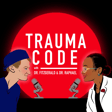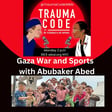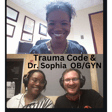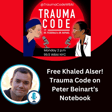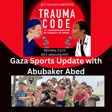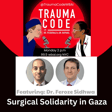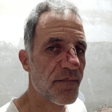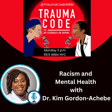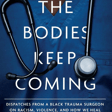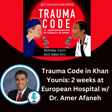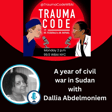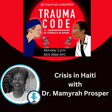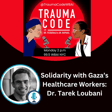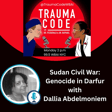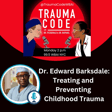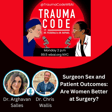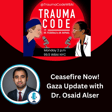Become a Creator today!Start creating today - Share your story with the world!
Start for free
00:00:00
00:00:01

Ending Torture in Israeli Detention with Israeli Physicians for Human Rights
We interview Oneg Ben Dror about torture in Israeli detention suffered by our partnerDr. Khaled Alser , as well as the chair of orthopedic surgery at Shifa Hospital Dr. Adnan Al Bursh who was murdered in Israeli custody.
Music by Bob Wine, Usain Bolt, Rim Banna and Cleo Soul
Recommended
Transcript
Supporting WBAI
00:00:00
Speaker
33 cents a day can help WBAI stay on the air. That's all it takes. As little as 33 cents a day. $10 a month. You can be at b a BAI buddy. A BAI buddy is someone who signs up to make a recurring monthly donation to WBAI using either a credit card, debit card, or by electronic fund transfer from your bank account. It's safe, secure, and easy.
00:00:25
Speaker
and it helps keep our unique alternative and diverse programming on the air. You'll get a WBAI membership card and other goodies. Sign up online. Go to wbai.org and click on donate. All the details
Program Highlights
00:00:40
Speaker
are right there. The WBAI buddy. Be one today.
00:00:47
Speaker
All right, and the previous program was the Attitude with Arnie Anderson and that is Heard Weekdays at 1 p.m. here on WBAI New York, 99.5 FM and wbai.org online. Stay tuned for Trauma Code coming up. It is now one minute past 2 p.m.
00:01:12
Speaker
Yeah man, welcome to the freedom show. itvan is a miniami cornernoja feel From wherever you are all over the world and I hope you're going to enjoy this. ah yeah they wrote to gami music he got to vokutu voovve got really far away from the land With me is my brother Nobyan Lee.
00:01:30
Speaker
yeah my brother Aziz Azion blessed love it's always good to do music with you bro pananggi um we are doing this as a freedom show but we don't like to you know sing sim so formalmont tri oxibamata you ko getra kobi too no enough favorite music it so or put de noga tok music ki wafe natugua mira choangga to get up on songga and kuru into ah we hope you all enjoy the show. We hope nobody gets offended because all we bring to you is love. Now this song is called Evivuzzo, bingi, nai ansan tono. Sound the vibe!
Introducing 'Trauma Code'
00:02:08
Speaker
Trauma code to New York City, trauma code to WBAI. I am Dr. Simon Fitzgerald, a Brooklyn trauma surgeon and surgical intensivist. And I am Dr. Cassandra Raphael, an adult and child psychiatrist.
00:02:21
Speaker
Welcome to Trauma Code. Together we will focus on healing our mind, body, and community from trauma. We'll discuss how wellness fits into the culture at large. Join us on Monday at 2 p.m. on WBAI.
Activism and Authoritarianism
00:03:57
Speaker
back to the trauma code. This is Dr. Simon Fitzgerald live and in studio for what is it? Monday, November 18th. And that was just a Bobby wine freedom song. There's like an hour and a half long broadcast that he did uh... in uganda as sort of a dissident a sort of pirate radio that they put out that's really excellent i've just been learning about uh... the history of bobby wine a little bit so definitely recommend that to everyone and and you know we didn't have a show last week after the election but i do kind of feel a sense of solidarity with uh... people like bobby wine who was persecuted you know violated in prison tortured at times exiled from uganda ah for standing against
00:04:42
Speaker
um Basically, dictatorship, authoritarian rule, the use of military violence against civilians in Uganda. and i you know To me, Museveni, the dictator that he was work sort of fighting against, is part of of an international trend that ah towards fascism that I think we even see rising in our own country.
00:05:05
Speaker
um as much in the Trumps and Netanyahu's and Modi's around the world as much as Museveni's. So anyway, I just learned a little bit about that history and I'm really been appreciating ah the music and ah the work of Bobby Wine. So I wanted to share that with you.
Dr. Khaled Al Sur's Detention
00:05:21
Speaker
Today and the other thing I'm really excited about, we have a guest on the line, in a minute we're going to have a music break, check our levels, and have on, I'll have to have her correct my pronunciation of her name, ah but Onig Benjor of um the Israeli Physicians for Human Rights ah to talk to us about ah what's been going on ah in Israel, in Israeli prisons with Palestinian prisoners and the role that ah the medical sort of society plays and and hopefully thinking about how we can have a more proactive and healthy and healing role. So I'm looking forward to that. But I did want to actually talk about one piece of work that we had been doing in Brooklyn. I recently
00:06:06
Speaker
spoke at a SUNY downstate event shared, um if you've been listening to the show, ah our work um ah telemedicine through military siege into Nasser Hospital, in-con unit, particularly in February and March of this year as the hospital was not only laid siege, bombarded, but ultimately invaded. Our scrub nurse was shot. our One of the surgeons was hit with shrapnel from a quad you know from ah drone quadcopter attack. And our partner, the head of the trauma team, Dr. Khaled Al Sur, was forcibly disappeared into Israeli custody for six months. And that's how um I first reached out to Israeli physicians for human rights.
00:06:47
Speaker
who, to their credit, managed to have a presence in those um detention facilities, even black sites, ah and were able to to find Khaled al Sur, give us our first sign of life from him, and ultimately we were able to, I think, ah help agitate and and earn his freedom.
00:07:04
Speaker
So we were presenting this work, this academic work published in The Lancet at SUNY Downstate and a ah there was a hit piece in the the New York Post that really had awful um incendiary and dishonest bad faith attacks on us, it's anti-Semitic.
00:07:22
Speaker
you know blood libel, and and all types of of really just awful words. They never bothered to speak to us, but there was a group that claimed to speak for all Jewish healthcare workers called the American Medical Jewish Association. um and you know They came after us, so I think we're going to have to to look long and hard about who who are these people that claim to speak for us. and For those who don't know, I, for whatever it was worth, grew up Jewish bar mitzvah at Baltimore Hebrew congregation, right? So people claiming to speak for me while trying to shut down my good faith scholarship to heal, to help lend solidarity to our partners in places like Gaza, a reflection of Jewish values that I learned, like to kun olam, to dakah, right? To save one person, it's as if you save the whole world.
00:08:12
Speaker
So um that's something we're going to have to be working on moving
Media Attacks on Scholarship
00:08:16
Speaker
forward. And I think there was actually a very impressive group of students and others, and including Jewish students, people who grew up you know studying and speaking Yiddish, people who grew up um in ah Orthodox um synagogues, really just being appalled by the situation in Gaza. And I think we're going to have to come together and put something in writing in response to these bad faith attacks.
00:08:40
Speaker
um But enough about that. Let's have a little musical break and um we're going to have on in a minute representative from Israeli Physicians for Human Rights. um But I did want to play a little piece of music. um i ah My wife and co-host Dr. Cassandra Rafael who couldn't be here today sent this to me.
00:08:59
Speaker
a song motivated by Usain Bolt. And for whatever it's worth, whatever you think about the the sort of musical talent in it, I'm definitely entering the rest of the year and the New Year coming with this kind of ah motivation. So this is going to be motivated by Usain Bolt. You're listening to Trauma Code on WBAI. Stay tuned, New York.
Detention of Health Workers
00:11:12
Speaker
Welcome back to The Trauma Code. This is Dr. Simon Fitzgerald in studio. And let's check. We had on a minute ago. Onig, are you there with us? Can you hear us? Yes. Hi. Can you hear me? Yes, excellent. um Speak up, speak close to the mic. Welcome to the Trauma Code in New York City. I think you're joining us from Israel, perhaps Tel Aviv. Thank you for um making some time. Do you want to ah introduce yourself, make sure that we hear your name pronounced correctly at least one time, and ah tell us kind of in what capacity you and I kind of met.
00:11:50
Speaker
Sure. and My name is Onek Bendro. I'm a project coordinator at Physicians for Human Rights Israel at the Prisoners and Detainees Department. And our contact started when you reached out to me regarding Khaled Dursar, a physician from Gaza who was ah arrested by the by Israel and was held in prison. for six months, and we and we managed to visit him in prison. and and And this is how we... And I know I am, and and I believe, you know, my partner, Kala's cousin on site, we're very grateful for your work. um Sometimes it's hard it's hard to find our people, so when we find people even
00:12:46
Speaker
a ah in places so far away but willing to lend solidarity. um Be mindful, Onig, your mic is picking up a lot of the background noise. um But so I wanted to say thank you and I appreciate your work, and but I also wanted to introduce, you know, can you give our audience who may not be familiar who is Physicians for Human Rights and particularly what has their history history been like in Israel with the Israeli Physicians for Human Rights group?
00:13:14
Speaker
so First of all, ah let me know if you hear me better now. Sounds great.
00:13:21
Speaker
Okay. and so Physicians for Human Rights Israel was founded um in 1988 during the first Intifada ah by a group of Palestinians and um Israeli Jewish physicians.
00:13:40
Speaker
um It started as ah as a mobile clinic and that actually until um October 2023 used to go to Gaza.
00:13:52
Speaker
and every, regularly and and in and in the past year, every month and doing trainings, providing ah equipment and for for facilities and surgeries. And also in the West Bank, and we also, and then the the organization also expanded on ah helping those under the responsibility of Israel, ah but doesn't get the same access to health care. So also refugees and asylum seekers and people from the social and ah geographical periphery and people in prison. And this is ah my department.
00:14:43
Speaker
And we know that there's an extensive population of Palestinians in sort of what is often called administrative detention, right? ah we've We've used the word arrest here, but this is people who are not being held with any of the kind of due process that we might take for granted um in a place like the United States for all of its problems.
00:15:01
Speaker
um but um but and i wanted to get to that first but i also wanted um you know since obviously a lot has changed since october 7th and particularly the amount of violence in gaza and what what has always struck me about the you know what what i've um in studying this and concluded and a lot of other people agree including you know israeli um uh uh academics studying the Holocaust, people like ah Raz Sagal and Omar Bartov, have have agreed that this genocidal violence will convince me that the term was correct, really was how the attacks have been systematic against um healthcare care facilities, ah hospitals, ambulances, doctors, nurses. um And, you know, that there's
00:15:48
Speaker
As I think of it, the history of the of the war, of the violence, really um iconic events that escalated that violence. right I think of the bombing of Ali Baptist Hospital that killed, an estimated a couple hundred people in October. um And one of the others was the attack on Shifa Hospital. I should say the attacks, and waves of attacks and invasions.
00:16:10
Speaker
um that ultimately killed five of their department chairs, um the head of you know internal medicine, ah OB-GYN, I believe, pathology, emergency medicine, um and as well as their nephrologist, Hamam Alo, who said in October of last year, we are being exterminated shortly before he was killed with his family.
00:16:33
Speaker
And I set all that up because um the the fifth um department chair, and and that violence has been repeated north and south down to Con Eunice and Rafa and places where where we did some work once we saw what was coming. But at Shiffa Hospital, what struck with me is is the fifth department chair that we learned was murdered was um Dr. Adnan Alberich, who was the head of orthopedics.
00:16:56
Speaker
who was really internationally known. Shifa Hospital is the main hospital, probably 20% of the the hospital beds in the occupied territory of Gaza were probably in Shifa Hospital, the main
Conditions in Detention
00:17:09
Speaker
tertiary care center. He was the head of orthopedics, and he was um arrested or you know abducted, however you want to call it, into Israeli custody.
00:17:17
Speaker
Do you, do you feel like, are you in a position where you can tell us about what happened to Adnan al-Barsh? You know, how was, how was he taken? What was his life and how, and how did it all end?
00:17:31
Speaker
am Sure. ah First of all, he he moved also after Al-Shifa was ah attacked and they couldn't work there. He moved to the Indonesian hospital and then to Al-Adha hospital within and the Gaza Strip, um where he was taken on December.
00:17:53
Speaker
um
00:17:56
Speaker
We know that he, we actually, ah we know a person who was with him in a military base and about 31 kilometers from the Gaza border, he calls that a man.
00:18:14
Speaker
And the person who was there said, ah back then on December, there were 100 people held there, Gazan detainees, quarter of them were healthcare workers. wow ah One of them was andda at Nanel Burj. He, over there, there were and handcuffed the whole time, blindfolded. and we We called it the Israeli Guantanamo.
00:18:43
Speaker
and And we know that and we don't know what happened in between where exactly he was but we also he he found he.
00:18:57
Speaker
He was transferred on April to offer prison, which is near Jerusalem. and It's in in the West Bank. and And there was ah there were people who were with him in the last half an hour of his life. They said um that he he am Basically he got a a welcoming of beatings and and severe violence um and he he ended his life his life and and he died in in the cell.
00:19:42
Speaker
<unk> in so like Sounds like my understanding. He was basically beaten to death by his relative. Beaten to death. That's correct. Yeah. and and that's so his His family described a healthy person and before and and people a who who met him then said he he was ah another person who saw him for a moment in transfer said he was kind of the and the shadow of what he used to be in in Israeli detention.
00:20:21
Speaker
And do you do you want to you know his his case is just one of, as you mentioned, at least 100 of health care workers. And we know, ah correct me if I'm wrong, at least one other physician was was killed in Israeli custody while you know under some kind of interrogation, and you may know of more.
00:20:39
Speaker
Do you want to kind of and and I apologize to my audience. I didn't I didn't have a trigger warning. We're talking about some serious topics ah with representative from Israeli Physicians for Human Rights about the conditions for it, particularly Palestinian health care workers who are forcibly disappeared by the Israeli military. um And this is of interest to me because our partner at Nasser Hospital, where we tried to offer some support during the military siege um you know remotely with telemedicine, Dr. Khaled al Sur,
00:21:09
Speaker
He was, you know, his trajectory seems in some ways very similar um to Dr. Adnan Al-Barsh. We know from your work at Israeli Physicians for Human Rights that he was abducted from the hospital. Once he returned, right, they force evacuated the hospital. Dr. Asr returned to the hospital to try to reestablish care, you know, emergency care, trauma care, surgical care for people in communist. And when the Israeli army returned, that was the the the sort of offense that we can gather. His audacity to provide care when they had tried to shut down the hospital was what caused him to be taken prisoner. He was held, ah correct me if I'm wrong, for for days at a black site in Gaza, and then taken, like, Adnan al-Bursh to Sidi Teman, and then ultimately to Ofer prison.
00:21:59
Speaker
Based on your work, can you tell us about, you know, was Dr. Albersa's, you know, severe beating, um ah what, you know, and this you describe him as shadow of himself. You know, was that typical and what did that process process look like? What have his Palestinian healthcare care workers been facing in before being forcibly disappeared for no crime into Israeli custody? What are they facing? So first of all, I would say that at the beginning it was very hard to understand well ah what is happening to them, and not only for healthcare care workers, but to all Gazan detainees. and Most of them, and Israel arrested thousands of ah people ah from from Gaza, and including also am minor and women, and elders, people with disabilities.
00:22:57
Speaker
And we know of a woman, 82 years old with Alzheimer that was arrested. And many of them are being a um classified as unlawful combatants, which allows, it was developed in parallel to to also the American law and under Bush legislation after 9-11.
00:23:25
Speaker
And it it kind of it started actually with ah Lebanese detainees and it allows Israel also using and the detainees as a bargain chips and also preventing them from access to a legal representation, contact any contact basically, from the outside world for very for long periods of time. so in the first half a year, and we couldn't, we we didn't there was no access i almost ah to Gazan Deteniz. After that, we we we managed to visit and ah some of the people and and especially we we focus on ah health healthcare workers and and ah people that we know that have
00:24:24
Speaker
either chronically ill ah patients or or they have different health issues. and What we know is that from the healthcare care workers that all of them were arrested for information gathering.
00:24:42
Speaker
So all of them were asking interrogations. They weren't accused. Most of them weren't accused of anything. um And they were asked ah about information, about the hospitals and the surrounding.
00:24:58
Speaker
um One person said that he was held in Gaza for seven days just to show um the Israeli ah forces where things are.
00:25:11
Speaker
um All the people that have been released, e describe um they said that they suffer from torture and they describe very harsh conditions.
00:25:27
Speaker
and we know
00:25:31
Speaker
it It was very hard to get official information about how many Gazan detainees died um under the the of under the Israeli custody. um on july week week after We appealed for for ah freedom of information. we request We got the number of 43. Gazan Deteniz, who died, ah but we assumed that the number um is even higher. um And I would say, and maybe we can also
00:26:09
Speaker
talk in general because also some of them are being transferred to the Israeli ah prison system and the Israeli prison service and and also their yeah oh um
00:26:26
Speaker
I would say that and even before the war, and you started with the administrative detainees, so people who are being held am under a classified secret information Again, they are not being charged of anything and for un long and unknown periods of time. Before ah October 7 in the summer of 2023,
00:26:56
Speaker
there were 1,200 administrative detainees and in the Israeli prison, and it was the highest number in in the like in more than two decades. um And they were in total, there were 5,000 and Palestinians classified as security prisoners and detainees in Israeli prison service. Now we are talking about 10,000 Palestinians in Israeli prisons and 3,500 administrative detainees. and There are about 2,600
00:27:38
Speaker
classified as unlawful combatants, about two-thirds of them are being held in the Israeli prison service, um and also 3,000 who are in pretrial detention.
00:27:55
Speaker
and and And even, yeah. Well, you make a ah ah you know a good point giving us the scale of of these abductions, basically, detentions, including of children and others.
Solidarity and Support Challenges
00:28:08
Speaker
um and But what I found um really outrageous and and I am appreciative of Israeli physicians' human rights work getting into the Black sites, the the type of abuse described um by our partner, Dr. Khaleda, sir, that he witnessed and suffered in six months of being forcibly disappeared by the Israeli military can only really be described as torture for people who have um committed no crime and whose offense is for insisting on providing appropriate medical, surgical and trauma care. And and again, a trigger warning, but I think it's worth being explicit about what he's telling us that, you know,
00:28:48
Speaker
ah They were held in in a big communal area and that there was a sort of you know humiliation, a public humiliation of daily random beatings, ah the use of chemical irritants into people's eyes, ah in addition to to verbal abuse and beatings, um sexual violence, forced penetration, the use of dogs to attack naked detainees.
00:29:11
Speaker
um you know really disturbing things. and um And we know that this violence you know even escalated. There's one famous case, you know correct me, and and this is um documented not only by ah Physicians for Human Rights, but Human Rights Watch has a report on how systematic torture and abuse of healthcare workers has been by the Israeli military.
00:29:33
Speaker
um And there was one kind of well-known, almost famous case where a group of soldiers basically gained great to detainee until he needed major abdominal and thoracic surgery. um and And as I understand it, the the physician who treated them maybe somehow was kind of whistleblowing or brought to the fore. This just rampant criminality, this horrible abuse,
00:29:58
Speaker
But those that were found to be responsible were right never seriously held in any kind of accountability. And in fact, correct me if I'm wrong, we're kind of embraced by an important and powerful part of Israeli society, right? We're able to go on ah mass media and um and there was plenty of political and public support for this kind of abuse for Palestinian detainees. is Do you agree with what I've said? would What would you add to that?
00:30:26
Speaker
Yeah, and I would say that um Palestinians and Gazan are and among them are being treated like that in in Israeli custody and and it's part of social kind of, um there is almost a consensus about it and support for for that.
00:31:01
Speaker
And yeah you know, I don't know if you heard right before we had you on the show, I was talking about my work, um you know, just being someone involved in and trying to support basic standard of care, trauma care um at Nassau Hospital in Con Eunice.
00:31:15
Speaker
um And I've faced attacks on, you know, our work, you know, even just speaking frankly and honestly, like we're doing right now, ah has um caused me to be attacked in professional and in, you know, public in the newspaper, even as anti-Semitic or blood liable and things like this.
00:31:33
Speaker
um but And including by some um you know physicians who are putting themselves forward as representing Jewish um healthcare care workers in the United States. you know and And there's a way which I've been really disappointed at our, even as American you know medical organizations and institutions and leadership, the lack of solidarity or even a willingness to to see our colleagues in um in Gaza, trying to treat people and um in our same craft, what they're undergoing and the lack of solidarity. But there's also a way that certain very influential um people, individual organizations have been more than that, have been complicit, have worked to silence good faith scholarship and debate and honest reporting about what's going on.
00:32:22
Speaker
and And so that's why, you know, when when you spoke to me about ah what Israeli Physicians for Human Rights is seeing amongst ah the Israeli Medical Society really resonated with me. ah Do you mind telling our audience a little bit more about that? What's going on with Israeli medical individuals, institutions, organizations
Healthcare Denial for Detainees
00:32:43
Speaker
and leadership? How are they engaging with this kind of violence and um abduction of health care workers?
00:32:52
Speaker
So um after a few days after the 7th of October, 2023, the health minister um published and a public statement saying that hospitals shouldn't admit ah terrorists.
00:33:13
Speaker
And this is how he he called patients. And it was followed by several hospitals that until today are refusing to treat am a Palestinian and prisoners and detainees in the hospitals.
00:33:31
Speaker
Even patients who arrived there were denied and were needed to return, and especially Gazan detainees. And I would say that also the the Israel Medical Association After we ah and send them a letter about that, they said that ah hospitals should treat and those terrorists, and again, ah calling patients terrorists, um but they they didn't do anything and um besides that.
00:34:11
Speaker
um and when When Palestinians are being admitted in in hospitals, um they are and blindfolded, shackled to bed. and Often no translation is provided. they don't know and They don't get any explanation on the procedure that is being done to them. Then there are medical and ah teams who refuse to treat and ah Palestinian patients and are needed to be replaced with others, some, and especially in the case of Gazan detainees, justify treating them for helping the Israeli security forces am and and others also um don't don't agree to provide any care that ah as they define is more than the bare minimum. So even
00:35:15
Speaker
am considering ah painkillers a privilege that they shouldn't receive. um We heard from medical teams that often um Palestinians, incarcerated Palestinians are being treated in inside rooms, so not in the ER, not in emergency room, ah and with without the proper equipment. And they are often, very often being released ahead of time, ah even in in life-dangerous situation.
00:35:49
Speaker
And in the field hospital in Steteman that we we mentioned before, and physicians were also weren't allowed to to give their name or to sign with their own signatures. The field hospital is located in a torture camp and and physicians could hear the screamings of detainees. and they receive they They were needed to carry out limp amputations, followed by the the shackling and handcuffing. um And often they received patients with broken bones and they declared deaths of people who suffer from severe torture.
00:36:42
Speaker
um And we believe it is against medical ethics and physicians should be shouldn't be ah part, um shouldn't take part in torture and and and should hold medical ethics and yeah.
00:37:08
Speaker
definite And um we know that there was also early on in the war, before the um escalation of attacks on hospitals, there were very public open letters by many Israeli physicians, including um some quite influential ones, I think a very senior pediatrician, in support of attacking um hospitals like Shifa Hospital, yeah if they were determined you know by the military to be a a military target.
00:37:32
Speaker
um So, you know, in in in light of that, what is Israeli physicians for human rights asking or saying to the um to the Israeli medical organizations? And um are you taking this ah beyond that? What, you know, in the international stage, ah what are you asking other medical associations in their position to be vis-a-vis the violence in Gaza and the role of Israeli um medical associations?
00:38:02
Speaker
So, and you know, the medical associations, they should and they should be kind of an accountability mechanism that ensure that um standard and and medical ethics are a with hope.
00:38:28
Speaker
um And that it it doesn't happen. And not only that, yeah and ah issues of ah breaches and violations are being often ignored or supported um by the Israeli Health Ministry and the Israel Health medical association a and we ask the international and medical community to to check whether am such a ah community is um ah can be part of the of the international community and are are holding the same values.
00:39:22
Speaker
um like and um And in terms of, you know, what can American physicians, for example, there are some that listen to our show, ah is there something we should be trying to um say through our institutions, organizations, and through our leadership? um is Is there an ask of of medical leaders in the U.S.?
00:39:47
Speaker
um I would say that and to help and hold Israel accountable and that those violations and you know those violations continues in in a net of torture camps and is being is being supported by and the medical community and and I would say it is am the the medical standards are even ah higher than human rights um and and even clearer.
00:40:30
Speaker
and And and it yeah and and i I'm a um nominally have been a little bit involved in a group in the US called Doctors Against Genocide. And I think one of their campaigns right now is to to just try to have health care workers. it It seems like a low bar, but it's very high for a lot of organizations and institutions to call for you know and not another hospital, no more violence against hospitals and health care workers, not another child, right? We're seeing.
00:41:01
Speaker
ah real after real on all social media of just children being killed in the most horrific ways and and as well as a attacks on hospitals and destruction of healthcare care capacity and I feel like this, you know, the the fact that a quarter of the detainees in these black sites are healthcare care workers tells me that they're a target and I feel like that experience that you describe, your prisoner solidarity work,
00:41:23
Speaker
um is is so important because of of how the ah forcible disappearance of healthcare care workers has been a part of this genocidal violence. um And, you know, there's a way, you know, as as in our country, our government um is likely to become more belligerent. um And there's been talks of, in some places, making it ah any organization that is doing any kind of prisoner solidarity work ah in um Palestine would be ah would lose any ah privileges they might have as as an American like NGO or other organization or institution and potentially face criminal liability so um I appreciate that the work that you guys are doing is like you said is is not popular there's a near consensus in Israel and support
00:42:11
Speaker
of the of this kind of violence. But you know let me just ask, what my parents listened to the show and and our physicians and my mom actually tested texted me um and wanted to ask you, ah is do you think that in Israeli society there's a recognition that the type of violence you describe is being carried out against Palestinian healthcare care workers?
00:42:33
Speaker
and I think and Palestinians and especially Gazans are and so ah dehumanized in the eyes in in the East.
00:42:51
Speaker
Oh no, we might've lost you. Still there on it? Society. Oh, good. We got you, man. There is no distinction. so I would say there is no and distinction and also and a understanding a special position, not for healthcare workers and and or or others.
00:43:18
Speaker
a what for here yeah Well, you know and i that's what I gathered from from what you were saying, but um it it is it is very disturbing just to understand how um a society can ah can kind of grow to have a consensus with that kind of violence.
00:43:38
Speaker
um And so, and I think that's, you know, I appreciate your work and I think, ah and this is what I've been trying to argue and when I discuss this, this kind of work I've been doing with various healthcare workers and and other institutions, Jewish or otherwise that, you know, there's an opportunity, you know,
00:43:56
Speaker
um with survivors to heal and I think doing work to to promote healing in the region is the alternative to the work that's going on, the money that's being spent to perpetuate violence in the region. So I want to say I i appreciate your work and and part of this conversation was to help us flush out some ideas about how to engage um in ah the US on on these topics that you're working on. So I really appreciate the time that you spent um And I know you have, um is there anything else that that you want to leave with our audience about the work that you're doing at Israeli Physicians for Human Rights?
00:44:35
Speaker
and Just that we we can't carry it alone and at the moment really, it is all what we discussed today is being endorsed by the Israeli court.
00:44:52
Speaker
And there aren't really, and I would say also and the um Red Cross, the ICLC is being denied any access to all the tension facilities since October, 2023. And there aren't really um ah accountability mechanisms in in place.
00:45:15
Speaker
And that's why we we need a help from outside. Definitely. and and And I think another part of it is that this violence is not isolated to Gaza, right? We've seen the attacks on hospitals, healthcare care workers, patients, ambulances, you know, medics and paramedics in the West Bank and places like Janine, as well as in Lebanon, where I think in the last 24 hours, you know, over a dozen ah paramedics were killed in an attack on a kind of civil service, um you know, first responder headquarters, um if if I have that correct. um And anything else, you know, I looked you up, I tried to understand a little bit more about you and and your work and your past. I know you have some writing in English. Is there anything that you want to talk about? Anything you've been working on or social media or anything that you want to let people know it about if they're curious to read more about what you're doing?
00:46:10
Speaker
ah Sure, so we published a report about the systemic violence and human rights violations m in prisons and in general in Israeli custody since October 2023. It is ah available on our website and also ah we published another paper and a report, a medical opinion about the the conditions of Gazan detainees and what we discussed. And and a yeah, I encourage you to
00:46:47
Speaker
And you'll have to send me those links and and I'll share them with our audience. um And you know, we're running up towards the end of the hour and if anyone is just joining us, you know, you're listening to the trauma code on WBAI and we've been speaking to Oneg from the Israeli Physicians for Human Rights about the condition of Palestinian detainees basically those forcibly disappeared many of whom uh... something like a quarter of them at times seem to be uh... of health care workers and and particularly the violence being suffered by ah health care workers uh... in israeli detention so definitely we appreciate your own egg and i and i wanted to give you also uh... an opportunity uh... to share with us any kind of uh... music book art
00:47:32
Speaker
um performance performance Anything that you culturally would like to share with our audience doesn't even have to do with the topic today ah So we can benefit from from being present with you a Happily and there is a song I recommend by We lost you for a minute on egg you coming back I
00:48:00
Speaker
yeah rim banna owning let me stop for a second but okay can you repeat that we cut out for a second who's a song buying what's it called It is by Rimbana.
00:48:17
Speaker
And it is called Zat Yom, meaning in some day. And it is about a Palestinian guy who got arrested and what it was um what happened to him in prison. All right. So thank you for joining us, Oneg. Let's take a little musical break, um and then we'll get towards wrapping up the show. And if you're just joining us, this is Trauma Code on WBAI in New York City. ah Stay tuned.
00:50:00
Speaker
walk in your
00:50:12
Speaker
All right. Welcome back to The Trauma Code. Definitely thank you New York City for joining us. And and I don't know how many other um platforms and and programs ah would give us a space to reach across the world, talk to partners in Israel, ah looking to um to work and support ah the humanity and and lend some solidarity to our colleagues, healthcare workers from Gaza, um in Israeli black sites. So I'm definitely very grateful for the work of Israeli physicians for human rights. um But also, I'm also grateful for, in this month of gratitude, ah for having the platform, The Legacy, ah to stand on the shoulders of giants at WBAI 99.5 to have the broadcast to the five boroughs and beyond,
00:51:00
Speaker
uh... and so look in order to do that we gotta pay the bills and now's a good time as any if you appreciate us and what we're doing on trauma code definitely go online to wbai dot org or give to wbai dot org and definitely we'd appreciate your support if you're going to be a b a i buddy or otherwise support the station let them know you appreciate trauma code and definitely if you reach out to me and are supporting you know the station to that level uh... we'll try to get you uh... assigned book in the past people who have given up to, I think, $100. I managed to get some signed books of guests from our show. So definitely, if you show that amount of support, I'll dig up and find some ah some of that work, such as our partner Rob Gore, whose book about working in Brooklyn communities to
00:51:47
Speaker
and violence and working with children in schools as well as in the hospital. ah So definitely, if you appreciate us, we appreciate you. ah And if you miss the show and want to try to find it, I'm going to put it out later today ah on the trauma code. um First of all, you can find it as soon as the show ends on WBAI radio archives, um but also wherever you get your podcasts, you can find the trauma code and you can listen to the whole thing. And definitely,
00:52:15
Speaker
ah We appreciate your support, so you know like it, subscribe, all of that stuff. Look for us on social media at Trauma Code WBAI and all your favorite platforms. Let me know if one is missing that that you think is valuable. and You can reach us by email at traumacodewbai at gmail dot.com with questions and feedback on the show.
00:52:37
Speaker
And so again, this is ah a reminder. We need your help. We need your support. WBAI. Go online. Give to WBAI. Become a BAI buddy. And while we're talking about it, we're going to round out the show. But ah Reggie, are you doing from the soundboard tonight at midnight? Do you want to tell anybody what to expect on the show today?
00:53:00
Speaker
Yeah, sure. So I'm going to continue on doing what I've been doing since so October of last year by focusing on musicians who support a Free Palestine. And this week will be on activists and percussionists known ah and she goes by Madam Gandhi. And so that's who I'm going to be focusing on today.
00:53:24
Speaker
Excellent. And I think we managed to dig up that song recommended to us um by Oneg. So we're going to wrap up. Let me see. Do I have the name of it here? ah By Reem Bana. Thanks for joining us, New York City. This has been the trauma code on WBAI.
00:54:21
Speaker
When I was young,
00:54:58
Speaker
small
00:55:02
Speaker
For WPFW News in Washington and WBAI in New York, I'm Sue Goodwin. Today is Monday, November 18th. Here are some headlines. President Biden has authorized Ukraine to use powerful long-range U.S. weapons deep into Russia.
00:55:22
Speaker
NPR cited a U.S. official who said the new policy allows Ukraine to use the Army tactical missile system to reach targets in Russia's Kursk region. The decision had been under consideration for months and came as Moscow is deploying nearly 50,000 troops to Kursk.
00:55:43
Speaker
The US had refused to send the long-range weapons to Ukraine for the first two years of the conflict, out of concern that such an escalation could draw the US and other NATO members into direct conflict with nuclear-armed Russia.
00:55:59
Speaker
The Kremlin said today that Biden's decision adds fuel to the fire, and Russian President Putin has suggested in the past that allowing Ukraine to use Western weapons to hit Russian territory, quote, will mean that NATO countries, the United States and European countries, are at war with Russia, close quote.
00:56:23
Speaker
In other news, President-elect Donald Trump today said that he is planning to declare a national emergency and use the US military to deport undocumented migrants. Overnight, Trump recirculated a social media post from a conservative activist who said there are reports the incoming administration is preparing such a declaration and will use military assets to support its mass deportation pledge. Trump labeled the post as true. Trump made his promise to deport millions of undocumented immigrants, one of the cornerstones of his 2024 campaign, and his team has already begun strategizing how to carry it out. The truth social post early today is the first time the president-elect has indicated how his administration will execute the controversial plan.
00:57:21
Speaker
A California grower has issued a nationwide recall of organic carrots, it produced for some of the country's leading supermarkets over an E. coli outbreak, including Kroger, Publix, Trader Joe's, Wal-Mart and Whole Foods.
00:57:39
Speaker
The recall, issued by Grimway Farms, comes after the Centers for Disease Control and Prevention said Sunday that cases emerged between September 6 and October 28 across 18 states, with Washington, Minnesota and New York reporting the highest number of cases.
00:58:00
Speaker
One person has died and at least 38 people have become ill following the outbreak according to federal health officials. The CDC warned that the outbreak may have reached additional states and the actual number of infected individuals is likely much higher than reported.
00:58:20
Speaker
The family of Malcolm X is suing the FBI, CIA, and New York City police departments for $100 million dollars for his assassination 59 years ago. The new lawsuit brought by Malcolm X's daughter, Ilyasa Shabazz, and other family members alleges the agencies were aware of serious and credible threats to Malcolm X's life and allowed the assassination to take place.
00:58:49
Speaker
Ben Crump, a civil rights lawyer who is representing the Shabazz family, said at a press conference, quote, we believe that they all conspired to assassinate Malcolm X, one of the greatest thought leaders of the 20th century, close quote. Eliaza Shabazz, now in her 60s, was just two years old when she saw her father gunned down in Harlem's Audubon Ballroom in Upper Manhattan while he was giving a speech.
00:59:20
Speaker
For WPFW News in Washington and WBAI in New York, I'm Sue Goodwin.

